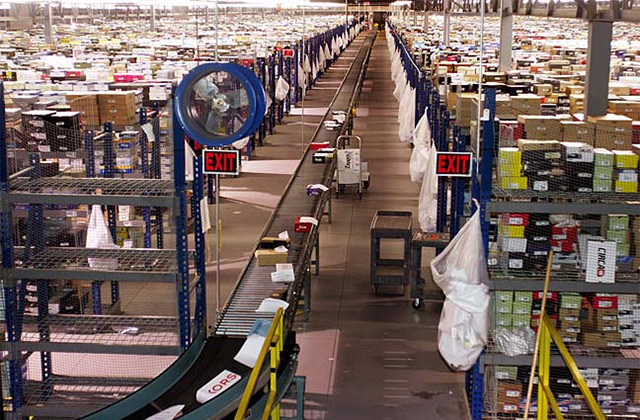
Probably the most intimidating part of starting an e-commerce business is purchasing and stocking the products you want to sell. Simply finding someone who will sell you the goods at a fair price is hard enough. On top of that, most manufacturers and distributors require a hefty minimum order amount that you might not have the budget or floor space for. How are you supposed to start selling if you can’t pay for your inventory or find a place to store it?
To address this common problem, there are a lot of industry members talking about drop shipping. Instead of stocking and shipping the products yourself, drop shippers promise to take care of supply and distribution for you. The dream of running your own business without having to worry about inventory management and order fulfillment sounds great, but is this hands-off approach too good to be true?
What is drop shipping?
Drop shipping is a modification of the traditional supply chain process. Instead of purchasing goods from a supplier and then reselling them to your customers, drop shipping allows you to pass the order directly to your supplier for them to fulfill.
You never touch the inventory, and you only pay your supplier for what you sell when you sell it.
When a customer purchases a product on your site, you take their payment, forward the order to the supplier (usually in the form of an automated e-mail invoice with the order details), and the supplier bills you for the product and ships it directly to the customer. With this system, you never touch the inventory, and you only pay your supplier for what you sell when you sell it.
Drop shipping can be a great benefit for both you and the drop shipper. By outsourcing the stocking and shipping of your goods, you have more time to spend running the other parts of your business. Meanwhile, your supplier is outsourcing some of their marketing, sales, and customer service efforts to you.
Why should you use drop shipping?
Drop shipping’s strengths are in its ability to simplify your business. It replaces complex supply chain logistics with an automated fulfillment system that works for everyone. A smart drop shipping implementation with the right software integrations can completely remove the need for you to be involved in fulfilling orders.
Many drop shippers don’t require a minimum order — you only pay for what you sell.
Drop shipping can remove an enormous barrier of entry for starting a business. Don’t have a huge budget for purchasing inventory? Many drop shippers don’t require a minimum order — you only pay for what you sell. You don’t need to buy or lease warehouse space, and you don’t need to worry about managing your stock.
Every business owner knows time is money, and they know how valuable their time is. Drop shipping effectively outsources the time spent on order fulfillment, giving you more hours in your day to spend earning business and serving customers.
Why fulfill orders yourself?
If drop shipping is such a great option, then why consider managing your own stock and fulfilling your orders in-house? As with just about everything in life, drop shopping isn’t perfect. It can come off as sounding too good to be true, and in many ways that’s accurate.
Drop shippers don’t want to give their time away any more than you do
Drop shipping tends to earn you a lower profit margin per order than you would earn by shipping the goods yourself. Drop shippers don’t want to give their time away any more than you do, and they have to cover the costs of their large-scale fulfillment solution. The workers, management, equipment, and warehouse space are all factored into the cost of drop shipping your goods, and that often adds up to more than it would cost for you to ship the order out yourself.
If you can purchase goods in large quantities, you can almost always negotiate a great wholesale price for them that drop shipping won’t match. Drop shippers won’t cut you any sweet deals if you’re only buying goods one at a time, so buying in bulk will help improve your margins even more.
Which method is right for you?
You probably see the pros and cons of drop shipping and of fulfilling orders yourself. How do you know which fulfillment method is right for your business? Like most business choices you need to make, it boils down to what will work best for your specific needs.
Drop shipping should be viewed as a fallback for when fulfilling products yourself isn’t practical.
If you have the storage space and the budget for purchasing, fulfilling orders yourself can increase your profit margins and give you more control over your business. By fulfilling as cheaply and efficiently as you can without sacrificing speed and reliability, you can hit a fulfillment sweet spot that works out well for you and your customers. As your sales grow, so does your cash flow, which you can use to negotiate lower prices from your vendors, increasing your margins even more.
Generally speaking, drop shipping should be viewed as a fallback for when fulfilling products yourself isn’t practical. This can be for specific products, such as low-volume niche sellers or products that are too large or difficult to ship for you to work with. A hybrid fulfillment approach, in which you fulfill some of your catalog while drop shipping others, is a common middle ground that many top brands use.
Note that if you don’t yet have the warehouse space to stock your inventory in bulk, you don’t have to resort to drop shipping. Instead, you can outsource your fulfillment to a third-party service like Shipwire. While this is a great way to have a hands-off fulfillment process without the per-unit costs of drop shipping, you may still be able to sell at higher margins by fulfilling orders yourself.

